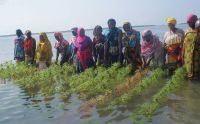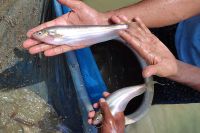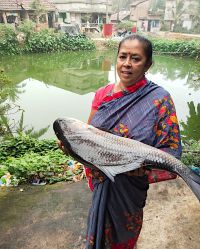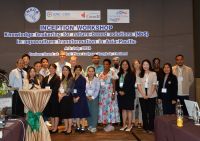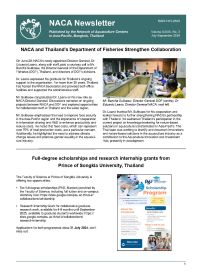FAO's Committee on Fisheries has adopted the Guidelines for Sustainable Aquaculture (GSA), which have been prepared to support efforts at all levels for enhancing the important role of aquaculture towards the eradication of hunger and poverty and to support socioeconomic development, in full respect of the environment, biodiversity and ecosystem functions. The GSA are a major milestone and a collective achievement by FAO and its Members, underscoring the global recognition of the vital role of aquaculture and the need for its continued sustainable development for the sake of current and future generations.
Ompok bimaculatus, locally known as pabda catfish, is widely distributed in the natural water resources of Assam and other northeastern states of India. It is a preferred indigenous non-airbreathing catfish with high market demand compared to Indian major carps and exotic carps. Due to habitat modification and over exploitation, pabda has been assessed as Near Threatened by the International Union for Conservation of Nature. This article describes the development of captive breeding protocols for pabda at the Pabhoi Fish Farm, including broodstock management, captive breeding, and larval rearing. Fecundity ranged from 20,000-22,000 eggs per 100 g body weight. Spawning was induced with Ovatide and eggs transferred to a flow-through system for hatching. Larvae began exogenous feeding after two days.
In India's north-eastern states and West Bengal, women's participation in aquaculture is around 55%. They are involved in pond fertilisation, nursery fish seed rearing, fish feeding, and harvesting. In Purba Medinipur, women practice family-based freshwater aquaculture in backyard ponds. This helps improve the health of rural households and supports their lives and livelihoods. Experts from ICAR-Central Institute for Women in Agriculture, Odisha, believe that improving rural women's access to credit and developing women-friendly aquaculture technologies can help. Involving women trainers and extension workers, and organising women aquaculture clubs, can also enhance technology transfer. This article describes the role of women in aquaculture in Haldia, Purba Medinipur, and the practices and business development of some leading women fish farmers.
Canada's International Development Research Centre (IDRC) is sponsoring the project "Knowledge Brokering for Nature-Based Solutions in Aquaculture Transformation in Asia-Pacific: Support to the Aquaculture Innovation and Investment Hub." The project is part of a wider IDRC AQUADAPT initiative, a four-year partnership running from 2023-2027. AQUADAPT addresses the intertwined challenges of climate change, biodiversity loss, and food insecurity through applied research on nature-based solutions in aquaculture in Southeast Asia and the Pacific region. AQUADAPT emphasises Gender Equality and Social Inclusion (GESI), ensuring that nature-based solutions are inclusive of all genders and marginalised groups. The project's inception workshop was held in Bangkok from July 4-5, bringing together project teams from Thailand, The Philippines, and Fiji to discuss approaches and methodologies.
In this issue:
- NACA and Thailand's Department of Fisheries Strengthen Collaboration.
- Full-degree scholarships and research internship grants from Prince of Songkla University, Thailand.
- Manual on Artemia production and use.
- The Grass Carp Aquaculture Manual.
- Pacific oyster farming: A practical manual.
- The State of World Fisheries and Aquaculture 2024: Blue Transformation in action.
- Safeguarding salt lake brine shrimp (Artemia) resources for aquaculture: A training project.
- Reported Aquatic Animal Diseases in the Asia-Pacific Region during the Fourth Quarter of 2023.
- First International Artemia Aquaculture Consortium Conference, 9 September (hybrid event).
